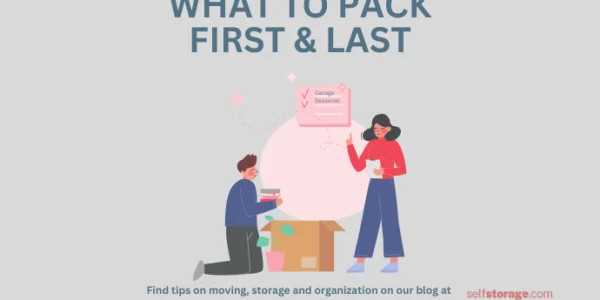What’s covered in this article – click on a link to learn more:
- Pre-Move Preparation
- Packing Services
- Loading and Transportation
- Unloading and Placement
- Additional Services
- Transparency and Accountability
- Timelines and Deadlines
- Post-Move Follow-up
- Choosing the Right Moving Company
- Moving Company FAQ
Moving to a new home? It’s more than just swapping addresses. It’s a big step! And every big step feels lighter with the right support, which is why you need professional movers by your side. But what do movers do exactly and how do moving companies work?
From packing up your memories in boxes to helping you settle into your new cozy corner, the right moving company makes all the difference and offers you peace of mind. This often boils down to having clear expectations. Knowing what to anticipate, every step of the way, builds trust between you and your moving company.
Pre-Move Preparation
It all starts with good planning – and you’re now on the step of your moving checklist where it is time to hire profession movers. Here’s how things will unfold when consulting with the packing and moving companies you are about to hire for your move:
- Moving Inventory. Take inventory of all of your belongings in your home that will be moved. This will be necessary to sent to the moving company for your quote. Your inventory will also be important to reference when doing your walk-through with the professional movers.
- Initial consultation. Think of it as speed dating with your movers. They will ask about the size of your pad, any unique items (like grand pianos or exotic plants) and your preferred moving day. This chat helps them get a handle on what you are going to need.
- Customized moving plan. This is your moving blueprint, showing what services you are getting and when. It is a game plan, so everyone knows what’s happening and when, tailoring services to your requirements.
- Cost estimation and budgeting. After your chat, the movers will give you an estimate that can be binding, non-binding or not-to-exceed (also known as “guaranteed price” or “price protection.”) Know exactly what kind of estimate you’re getting so you can make accurate comparisons and be leery of a lowball estimate. This is one of the ways to avoid moving scams.
Packing Services
If you have opted to go with a full-service moving company, you might expect that packing services are going to be included in your moving plan. However, packing services is not typically always provided by professional moving companies, so be sure to bring this up during your consult if you want to take advantage of this service.
Regardless of long-distance or local moves, where packing and moving companies might charge these extra services by the hour, they can be a lifesaver and you should take them into account, especially when juggling a lot on your moving checklist. Professional movers don’t want any unpleasant surprises with poorly packed items, whether it’s something as fragile as mirrors or as bulky as vintage furniture.
Packing materials and techniques
Do moving companies provide boxes? Well, when you opt for packing services, the professionals do come with all the materials — boxes, bubble wrap, packing paper and tape. They split into teams covering different rooms, employing tried-and-true packing techniques to ensure your items are snug and safe, making the most out of the space in each box. They’ve got the knack to pack!
Fragile items handling
Got some delicate items? No worries! Whether it’s fine china or your cherished art pieces, the pros know how to handle them with the care they deserve. You can even ask them to pack only specific fragile items if you’ve got the rest covered. They bring a gentle touch ensuring your fragile items remain in one piece, from point A to B.
Note: It is important that you point out all fragile items to your moving crew to ensure that these items are packed appropriately.
Labeling and organization
Now, while the packing experts will label each box based on the room, they won’t list individual items. However, they make sure the label clearly indicates the room it belongs to, making it easier for you (and them) to know where each box should go in your new place. It’s important to keep things organized to ensure a breezy unpacking experience at the other end.
Loading and Transportation
This is the real deal, where your belongings hit the road! Let’s see how you can make sure your items are snugly packed and smoothly transported to your new place.
Professional loading and secure transportation
So, the packing is done and it’s time to load ‘em up! What do moving companies do next? A crew with special skills in moving and securing heavy items takes the stage. They transform the moving truck into a Tetris game, making sure every inch is efficiently utilized. While this saves space, it also prevents your stuff from playing bumper cars on the road.
Heavier items get tied down with special moving mats, straps and locks ensuring they stay put during the transit. The way these pros place and secure your items in the truck reduces the risk of any damage once the wheels are rolling and your belongings are on their way to their new home.
Tracking and communication
Here’s where you get to feel like a moving-day director from the comfort of your couch! The truck driver will have your cell number and email to keep you in the loop about the progress. And with some companies, you get to track your move online. Staying informed is key so you are not left wondering when your belongings will arrive.
Types of transportation vehicles
For the smaller, local moves, moving vans or medium-sized straight trucks might just do the trick. They squeeze through tight city spots much better. But when the journey is long or there is a mountain of stuff to move, the big trucks like tractor-trailers step in. These giants carry larger loads, making them a savvy pick for long treks or big hauls.
The choice of vehicle can impact the cost, speed and ease of your move. Equipped with the right vehicle, your move can be much smoother and could even save you some pennies!
One more thing. Before the crew hits the road, you get to do a final walkthrough to ensure nothing’s left behind. It’s your last goodbye to the old place, and a step closer to your new adventure!
Unloading and Placement
Now, as the truck reaches your new place, it’s game time again. The pro movers will follow their unloading strategy, checking off each item from the inventory list to ensure everything has made it safe and sound. When it comes to placement, they will need a bit of your insight, of course. Guide them where you’d like your furniture and boxes to go in the new space and don’t even think about skipping this part — it will save you the heavy lifting later!
Note that some pieces of furniture may have been disassembled for the move. If you did that yourself but don’t feel up to the task of putting it all back, it’s not too late to ask for a helping hand. Professional movers have the proper tools to get them back in one piece and ready for use, but this will likely incur an additional cost (utilizing movers for labor is an expense typically charged by the hour). Having the assembly instructions handy would be a plus.
Additional Services
As you noticed, moving doesn’t stop at just packing and transporting your items. In fact, there are a slew of additional moving company services that can be provided to ease your transition. We already mentioned disassembling and reassembling, but that’s just scratching the surface. How about these extra types of moving services?
Temporary storage options. There might be a brief period between moving out and moving in. During this time, your movers can offer safekeeping for your belongings in secure storage. Or a cozy hotel for your stuff, as we like to call it.
Specialty item handling. Got a grand piano or a priceless piece of art? No worries! There are movers skilled in handling oversized or highly valuable items, showing them the good care they deserve.
Communication and Customer Support
Moving to a new place can feel like a big deal. But guess what, you’re not tackling this giant task alone! A good moving company will ace the communication and customer support game. Read the reviews and choose a partner who is interested in understanding your needs and is ready to help at every bend, keeping the lines of communication open all the way. Changes in plan? Concerns sprouting up? No problem! A simple call or email, and your moving company should be there to adjust and reassure, never leaving you in the dark.
Now, whether it’s a last-minute snag or a random question that pops up, having a go-to team for support is a big plus. You should be able to reach out for help at any stage, from the minute you start planning the move to the time the last box finds its spot in your new place. Hiring a moving company with robust communication and customer support is like having a road trip buddy who’s got the map, the snacks and the playlist all sorted. Your job? Just enjoy the ride!
Transparency and Accountability
Packing up and shifting to a new place is a big deal, but it doesn’t have to be a headache. A good moving company makes sure you know what’s happening, when it’s happening and how much it will cost.
Make documented agreements. When you decide on a moving company, they will give you the lowdown in writing — what’s expected, the cost and the terms of service. This contract is your new best friend, the official word on what’s agreed upon between you and the moving company.
Consider all moving insurance options. We all hope for smooth sailing, but sometimes things go sideways. That’s where home moving insurance steps in. The biggie here is “valuation coverage” offered by interstate movers.
- Full Value Protection: This is a security blanket for your belongings. If anything gets lost or damaged, the moving company has to either fix it, replace it or pay you its current market value. It’s a bit pricier, but hey, peace of mind, right?
- Released Value Protection: This is the no-cost buddy. But here’s the kicker, if something goes south, you will only get small change — 60 cents per pound per article, to be precise.
Handling claims and dispute resolution. Oops, found a scratch on the antique table? Don’t sweat it. There is a system to voice your concerns and get issues sorted. You have a nine-month window from the delivery date to file a claim with your mover. The quicker you report, the quicker it gets resolved. Now, say you and your moving company hit a snag and see things differently. They’ve got an arbitration program to handle disputes. It’s their way to sit down with you, albeit virtually, and iron out any wrinkles in the agreement.
Timelines and Deadlines
Moving is a big project, but hey, with a good heads up on how long it will take, you can plan your days around it. Your moving company should give you a ballpark figure of the move duration so you can mark those calendars and plan your life around it, whether it’s a quick hop over to the next town or a long trek across states.
Let’s talk about being on time and sticking to the plan. It matters because nobody enjoys hanging around, right? A solid moving crew values your schedule, showing up when they say they will and keeping things running smooth. Their ability to be punctual means fewer hiccups in your day-to-day activities. After all, a seamless move is one that runs like clockwork.
Of course, life is full of surprises and sometimes, delays happen. What’s important is for them to be communicated as soon as possible. If there is a hiccup along the way, a solid moving company will give you a heads-up promptly, and clear communication on any schedule changes ensures you are never left guessing and can adjust your plans accordingly.
Post-Move Follow-Up
Once the dust settles, sharing your moving experience helps both the movers get better and other folks find the right help. So, pen down a review and share your thoughts: were the movers punctual, careful, friendly? Your feedback is golden!
Got questions even after the move? A worthy moving company stays with you through thick and thin. Whether it’s a box placed in the wrong room or a missing item, they should be just a call away to address any of your post-move concerns.
Did you find any scratches, dents or other issues after the move? A good moving company has a straightforward process for filing claims for any damages or losses. They will walk you through it, ensuring your concerns are addressed professionally.
Choosing the Right Moving Company
There are loads of moving companies out there but, which one is the right match for you? Do a bit of homework and consider factors like their services, pricing and areas served. Next, what’s the word on the street? Reviews and testimonials paint a picture of what to expect. Hear out folks who have walked the path and learn from their moving adventures.
Consider the fact that people are more likely to share bad experiences than good ones and that companies often try to beef up their ratings with fake reviews. Take all comments with a grain of salt and disregard the outliers.
Finally, be on the lookout for any red flags. Too many negative reviews, unclear pricing or lack of insurance? These could be warning signs that are not to be taken lightly. After all, it’s your big move, so picking a company that is upfront and clear is key.
Professional Movers Are There To Help
Going through the whole moving process with a trustworthy company is vital. From the initial in-house consultation and safe packing to efficient transportation and setting up your new place just the way you like it — every aspect of moving should be a breeze.
And here’s the thing, good communication is key in this process and a professional moving company knows that. Open channels of conversation keep misunderstandings at bay and make room for a smooth move.
Planning ahead and picking wisely is your ticket to a stress-free move. Take a breather, do a bit of digging and find a moving company that just gets you. Trust us, it’s a move worth making.
FAQ About Packing and Moving Companies
How do I prepare my house for movers?
Prepping your house for movers starts with decluttering — say goodbye to stuff you don’t need. Then, do a thorough clean-up. It’s handy to have a clear pathway for the movers to maneuver. Also, keep your valuables and important documents in a safe spot. Lastly, it’s a nice gesture to have some snacks and drinks for the hard-working crew!
Can I leave clothes in drawers when moving?
It’s usually okay to leave clothes in drawers if the furniture is sturdy. But it’s wise to check with your moving company first. Some prefer empty drawers to reduce weight and avoid any potential damage. If they give you the go-ahead, make sure the drawers are secured to prevent them from sliding open.
How much should I expect to pay to move?
The moving cost can really range depending on a couple of things. If you are just moving to a new spot in town, you are probably looking at an average cost of about $1,250. However, if you are tackling a long-distance move, say around 1,000 miles, the cost could jump up to around $5,000 or so.
Now, the size of your move is a big player in the cost game too — moving a larger 3-bedroom home is naturally going to cost significantly more than relocating a cozy 1-bedroom apartment. There are handy online calculators that can give you a rough idea of what you might spend based on your specific situation, like how big your place is and how far you are moving. Note that adding extra services like packing or nabbing some storage space will nudge that price up.
What are the cons of moving companies?
First off, packing and moving companies can be a bit pricey, so you will need to properly budget for that. Also, even with the best ones, there is a small chance that some of your things could get dinged or go missing — though they do have insurance to cover mishaps. Another thing is that not all moving companies are created equal. You might run into one that is a tad slow on communication or not super punctual. That’s why it’s a good idea to do a little homework, read some reviews and pick a moving company that has a shining track record.





